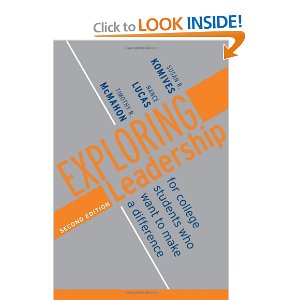In researching and writing a couple of earlier publications on leadership courses as well as leadership retreats, I reviewed a number of leadership books used with students. I’d like to highlight five books that could be great for students and used within courses or programs. I choose books that are relevant for and geared towards students, are good theories to develop educational experiences around, and are readily applicable for leadership practice by students.
 Exploring Leadership: For College Students Who Want to Make a Difference
Exploring Leadership: For College Students Who Want to Make a Difference
You could build your leadership education experience around the five components of the Relational Leadership Model which is a good leadership framework for college students.
1. Inclusive
2. Empowering
3. Process-oriented
4. Purposeful
5. Ethical
Stated Description: This book provides a unique view of leadership as a participatory process, and helps students and young adults to develop their own potential for leadership in the organizations, groups, and communities of an increasingly diverse and complex world.
This book is widely used and was developed specifically for college students. An instructor’s guide is also available online.
 The Leadership Challenge
The Leadership Challenge
Using this book you can build the content of your course or experience around the five exemplary practices of leadership.
1. Challenge the Process
2. Inspire a Shared Vision
3. Enable Others to Act
4. Model the Way
5. Encourage the Heart
Stated Description: The Leadership Challenge has become one of the best-selling leadership books of all time. The Leadership Challenge is grounded in extensive research and based on interviews with all kinds of leaders at all levels in public and private organizations from around the world. In this edition, the authors emphasize that the fundamentals of leadership are the same today as they were in the 1980s, and as they’ve probably been for centuries. Leadership is not a fad. While the content of leadership has not changed, the context has-and in some cases, changed dramatically.
This is a leadership book that has sold over one million copies and is based on a large amount of research. It is not written specifically for college students but is applicable. It proposes the five exemplary practices of leadership. The Student Leadership Practices Inventory, an instrument for college students, and The Leadership Challenge Workbook, would make excellent companions to the book for conference developers.
 Primal Leadership
Primal Leadership
You can build the leadership learning content around Personal and Social Competence and/or the Emotional Intelligence Domains.
1. Personal Competence
a. Self-Awareness
b. Self-Management
2. Social Competence
a. Social Awareness
b. Relationship Management
Stated Description: Daniel Goleman’s international bestseller Emotional Intelligence forever changed our concept of “being smart,” showing how emotional intelligence (EI)-how we handle ourselves and our relationships-can determine life success more than IQ. Now, Goleman teams with renowned EI researchers Richard Boyatzis and Annie McKee to explore the role of emotional intelligence in leadership. Unveiling neuro-scientific links between organizational success or failure and “primal leadership,” the authors argue that a leader’s emotions are contagious. If a leader resonates energy and enthusiasm, an organization thrives; if a leader spreads negativity and dissonance, it flounders. Drawing from decades of analysis within world-class organizations, the authors show that resonant leaders-whether CEOs or managers, coaches or politicians-excel not just through skill and smarts, but by connecting with others using EI competencies like empathy and self-awareness. And they employ up to six leadership styles-from visionary to coaching to pacesetting-fluidly interchanging them as the situation demands.
This New York Times national bestseller is from the author of Emotional Intelligence (EI). This book could be interesting for students as it looks at leadership through a different lens of emotion.
 Emotionally Intelligent Leadership
Emotionally Intelligent Leadership
This new book provides a guide for students on emotionally intelligent leadership. You could build your leadership development experience around the core facets of the model of emotionally intelligent leadership.
1. Consciousness of Context
2. Consciousness of Self
3. Consciousness of Others
Stated Description: Because the campus environment provides a rich array of diversity and opportunities for honing leadership skills, college students are in the unique position of having a “learning lab” at their disposal. Emotionally Intelligent Leadership is a groundbreaking book that combines the concepts of emotional intelligence and leadership in one model—emotionally intelligent leadership (EIL). This important resource offers students a practical guide for developing their EIL capacities and emphasizes that leadership is a learnable skill that is based on developing healthy and effective relationships.
Step by step, the authors outline the EIL model (consciousness of context, consciousness of self, and consciousness of others) and explore the twenty-one capacities that define the emotionally intelligent leader. Leadership, the authors explain, is within everyone’s ability to develop and is not just for those in official roles in formal organizations. The book explores the concept of leadership as a process among people working together productively in the group rather than simply a top-down phenomenon. Emotionally Intelligent Leadership offers a clear and engaging perspective on leadership as well as a practical guide for applying leadership skills. The book offers tools for reflection on the concepts of leadership. It also provides students with exercises to learn more about themselves, work more productively with others, improve relationships, and be more effective in demonstrating their leadership. There is also a workbook available.
 A Social Change Model of Leadership Development
A Social Change Model of Leadership Development
The three components of the leadership development model and/or the “seven C” values are good content for leadership educators.
1. Individual Values
a. Consciousness of self
b. Congruence
c. Commitment
2. Group Values
a. Collaboration
b. Common purpose
c. Controversy with civility
3. Societal/Community Values
a. Citizenship
b. Can also add a section on “Change” if you need another C!
Stated Description: This approach to student leadership development was initially developed by a 15-person “Working Ensemble.” The approach differs in certain basic ways from traditional approaches that view “leaders” only as those who happen to hold formal leadership positions and that regard leadership as a value-neutral process involving positional “leaders” and “followers.”
This short guidebook was developed for leadership educators to use with college students. Citizens of Change: The Application Guidebook and The Socially Responsible Leadership Scale are companions for using the social change model with a conference. The Citizens of Change Application Guidebook is excellent. It is filled with many different activities that correspond to each of the social change model values. I highly recommend it for your leadership development resource library. It is available from the National Clearinghouse for Leadership Programs.
Many of these books were originally featured in an earlier publication of mine. I’ve adapted from Eich, D. (2005). Developing a quality leadership retreat or conference: Intensive learning for personal and group development. Leadership Insights and Applications Series #20. College Park, MD: National Clearinghouse for Leadership Programs.